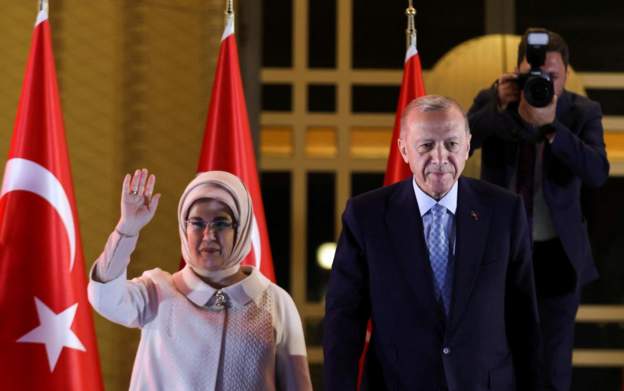ISTANBUL, Turkey (KAAB TV) – Following a closely contested runoff race, Recep Tayyip Erdoğan has secured victory and secured another five-year term as the President of Turkey, defeating opposition candidate Kemal Kilicdaroglu.
Erdoğan, known for his firm grip on power and contentious relationship with Western allies in NATO, is set to continue shaping Turkish society with his conservative agenda. With aspirations of positioning Turkey as an influential nation economically and geopolitically, Erdoğan’s re-election reinforces his vision for the country’s future.
Ahmet Yener, the chairman of Turkey’s supreme election council, confirmed Erdoğan’s victory with 52.14 percent of the votes in the runoff election, while Kemal Kılıçdaroğlu received 47.86 percent. Yener stated that the remaining uncounted votes would not affect the outcome, as Erdoğan held a significant lead of over 2 million votes.
Despite the challenges facing Turkey, including an impending economic crisis, Erdoğan’s supporters celebrated his win and praised his efforts in elevating Turkey’s status as a powerful Muslim nation. Thousands gathered outside the presidential palace in Ankara, waving Turkish flags in a show of support.
Expressing gratitude during a victory rally, Erdoğan thanked the people for entrusting him with the responsibility to lead the country for another five years. He called for unity and solidarity among the Turkish population, emphasizing that his victory represented a triumph for the nation and its democracy.
In a brief concession statement, Kılıçdaroğlu expressed genuine sadness about the challenges that lie ahead for the country.
World leaders, including U.S. President Joe Biden and UK Prime Minister Rishi Sunak, congratulated Erdoğan on his re-election and expressed their willingness to collaborate as NATO allies. European Commission President Ursula von der Leyen, French President Emmanuel Macron, and German Chancellor Olaf Scholz also offered their congratulations.
Erdoğan’s path to power
Erdoğan’s path to power began with his tenure as the mayor of Istanbul in the 1990s, followed by a period of imprisonment when his party was banned. However, he made a remarkable comeback, establishing the AKP party and assuming the role of prime minister in 2003.
In 2014, Erdoğan became Turkey’s first directly elected president, vowing to enhance the presidency’s authority and promote a period of social reconciliation.
Following a failed coup attempt in 2016, Erdoğan utilized emergency powers to clamp down on dissent and consolidate his influence.
His re-election extends his leadership of Turkey beyond two decades.
Turkey-Somalia relations
Under Erdoğan’s administration, characterized by the Islamist-leaning AKP party, Turkey’s diplomatic and developmental cooperation with Somalia has flourished since 2011.
The partnership encompasses military, social, economic, and infrastructural initiatives. With Erdoğan’s re-election, it is anticipated that the relations between Ankara and Mogadishu will further strengthen.
Since 2011, when Erdogan became the first global leader to visit drought-ravaged Mogadishu, the relationship between Turkey and Somalia has progressed significantly.
Over the past decade, Turkey has contributed over $1 billion in humanitarian assistance to Somalia. Notably, the largest embassy building of Turkey worldwide is situated in Mogadishu, the capital of Somalia.


